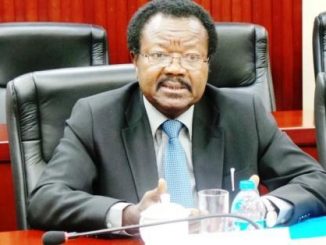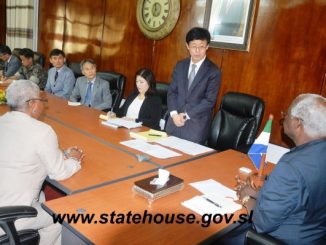CHOOSING A RUNNING MATE: Rights, Expectations And Decisive Leadership…(Part I)
By Morie Mussaffa
There had been some grumbling by some people both inside and outside the Peoples Movement for Democratic Change (PMDC) party, about the most recent selection of Dr. I. I. Tejan Jalloh by the leader and Presidential candidate, Mr. Charles Francis Margai to be his running mate. This is perfectly understandable and acceptable especially when, in the realm of modern political dynamics, rights, expectations and decision making can sometimes get misunderstood with authorized democratic principles and provisions when the rights of leadership, the general expectations of people and an effective decision making effort run into a collision course due to undefined or misconstrued expectations.
Please exercise patience, everyone, as time will soon prove that the juiciness of a mango lies in the eating.
The basic structural requirements of democratic governments have long since resolved this problem by clearly defining the principles of separation of powers between people and/or institutions of government such as between the executive, legislative and the judiciary, for example. Of course, even with the prevalence of these definitions, there can still be instances of usurpation of one power structure by another, or one person grabbing more than one power element such as is now being seen exercised by the current Vice President who is both the leader of a political party (a legislative-based function) while still performing the role of Vice President (an Executive function), in clear contravention of the national constitutional provisions. These defined political structures are emulated in one form or another in political parties, for example. But sometimes a simple misunderstanding or lack of practical experience can subscribe to convoluted expectations.
The Candidate’s Right To Choose A Running Mate: Even in the most democratic nations of the world, such as the United States, the right of a presidential candidate to chose a running mate is, perhaps, the one area in democratic principles and traditions, that is reserved for the authority and privilege of the candidate. And the reasoning behind that tradition is to give the candidate the opportunity to select the person he or she can best and comfortably work with, especially in terms of establishing trust and the ability to provide effective and smooth leadership.
No government can work flawlessly and effectively where the leaders cannot work together. Where a problem occurs as a result of the inability to work together, the judgment of the leader is very often called into question and blames are cast at the leader. This is why the Presidential candidate, for example, is given the opportunity to select his running mate, or for the President to choose his Cabinet Ministers. The right for the Presidential candidate to choose his running mate is provided in Section 54(2)(a) of the 1991 Sierra Leone Constitution.
The difference, however, between the two rights to choose is that, in the case of the selection of a running mate, the decision is largely that of the presidential candidate while cabinet ministers selected by the President must first be approved by Parliament. Both cases are fundamental principles of the democratic tradition. It is for this reason that we can conclude that President Kabba’s dropping of Vice President Demby in midstream can be considered a serious error in judgment.
Since a Vice President is supposed to be only a “heart beat away” from the Presidency, it should be paramount on the Presidential candidate that the choice be the strongest of any selection in the administration. Very often it is cabinet ministers other than the Vice President who are let go in cabinet reshufflings in most countries around the world. Rarely do you hear of Vice
Presidents getting reshuffled or dismissed. That’s why it is necessary that the decision to choose a running mate, who will be the Vice President, be left totally to the Presidential candidate because ultimately he or she takes the blame for any subsequent problem. And words are that, it was due to group influence over Kabba in the beginning that caused the later dismissal of Vice President Joe Demby.
Sometimes when an authorized provision constitutionally mandates multilateral participation in a specific decision making process, no one person can be specifically held responsible when problems occur. Very often this situation can lead to chaos or lack of accountability. On the other hand, where a provision constitutionally authorizes a specific agent or leader to make a specific decision without a required multilateral input, then the authority provided that agent should be equally respected and left alone to his discretion.
If Charles’s running mate were to be selected by group consensus on a majority-based platform, for example, then he cannot be held responsible if problems eventually occur whereby he cannot get along with the running mate chosen by a group. But by that time, all memories would have evaporated as to what were the fundamental causes, and only he will be left to blame.
A typical example of this scenario is now in play before our own very eyes whereby the SLPP presidential candidate, Berewa, still has not been able to select his running mate almost two years later, because, although it may not be admitted publicly, but speculations are that the decision to select is still not being left to the exclusive domain of VP Berewa. Words are that Kabba still want to weigh in with his own preference, hence the stalemate persists. In such situation, the party, the people and/or the state will be the ultimate victim(s) when functions do not get performed as a result of the effect of forced shared responsibility.
Choosing a running mate is, perhaps the first and most important decision a potential President can be allowed to make early in his or her election period. It is the first opportunity a potential leader has to demonstrate his or her ability to be decisive as a leader. It is also the first opportunity for the country to judge and speculate the kind of leader this new person is going to be. That decision should be left in the exclusive domain of the candidate.
Expectations Of The People: It is quite natural for a presidential candidate to request advice and recommendations from other people in making a selection, but he is not obliged to accept any recommendation. Of course, it is not out of character for the decision to select a running mate to be influenced or shared by other people. In fact, it should be a privilege for any one to be asked for an input in order to have greater latitude for the decision making choices. Granted, that the ability to know the person to be selected can be facilitated especially where public acquaintance does not exist. Hence input from others, especially to determine such testimony as to character, personal and moral values, experience, qualification, considerations for regional and ethnic balance, winning probability and other factors can be valuable. What is unacceptable are impositions due to financial infusion, functional participation, personal acquaintance or influence, or unreasonable expectations.
So for people to feel that some kind of public or private consensus reached by a group of people must be binding on the presidential candidate is quite surprising and makes one to feel that, for one reason or another, some kind of undue influence or pressure may have been exerted upon the presidential candidate to manipulate his or her decision making. And it is not even healthy for organizational stability. Even if one is offered the opportunity to make input, it shouldn’t be expected that one’s own input or recommendation MUST be the one to be accepted. At the end of the day, the final decision should still rest with the candidate.
Surely, we would all like to have our own choices, advice and preferences to be accepted by the candidate. But we must realize that there is only one position for the lots of our choices and recommendations. So whose choice or recommendation should be accepted and whose own should be left out or rejected? Our best expectation therefore, as members and supporters, should be to live with the hard choice already made and just move on from here and fix our objectives on the final prize, and that is, the election of our candidate and his chosen running mate. I think it’s the best option for all the effort that all of us have put in this campaign so far in one form or another. We cannot let the candidate’s choice distract us or impede our efforts from the rest of the work that lie ahead.
LOOK OUT FOR PART II…
Morie Mussaffa
New Jersey, U.S.A




Leave a Reply